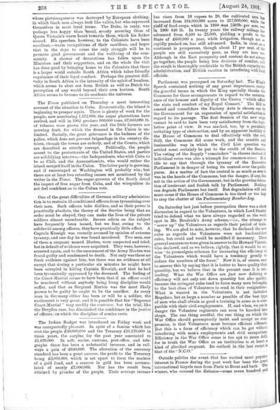One of the great difficulties of German military administra- tion
is to restrain ill-conditioned officers from tyrannising over their men. Such officers take dislikes, and as their power is practically absolute, the theory of the Service being that an order must be obeyed, they can make the lives of the private 'soldiers almost unendurable. Severe edicts on the subject have frequently been issued, but we fear; owing to the solidarite among officers, they have practically little effect. A Captain Krosigk was recently accused by opinion of extreme tyranny, and one day he was found murdered. Two men, one of them a sergeant named Marten, were suspected and tried, but in default of evidence were acquitted. They were, however, arrested again, and to the amazement of the Army Marten was found guilty and condemned to death. Not.only was there no fresh evidence against him, but there was no evidence at-all except that during a particular six minutes he might have been occupied in killing Captain Krosigk, and that he had been tyrannically oppressed by the deceased. The 'feeling of the Court-Martial seems-to have been that if an officer could be murdered without anybody being hung discipline would stiffer, and that as Sergeant Marten was the most likely Person to be guilty he ought to be the sacrifice: As every Man in Germany either has been or will be a soldier, the excitement is very great, and it is possible that the "Supreme Court-Martial " may modify the sentence, but the trial, like the Dreyfus case, has diminished the confidence in the justice of officers, on which the discipline of armies rests.


































 Previous page
Previous page